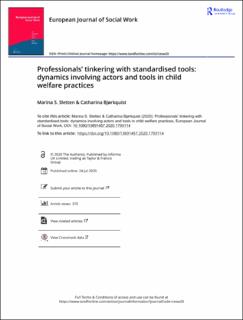Professionals’ tinkering with standardised tools: dynamics involving actors and tools in child welfare practices
Peer reviewed, Journal article
Published version
Permanent lenke
https://hdl.handle.net/11250/2728780Utgivelsesdato
2020Metadata
Vis full innførselSamlinger
Sammendrag
Denne artikkelen har til hensikt å utforske hvordan de profesjonelle i barnevernet tilpasser standardiserte verktøy til sin praksis. Oppmerksomheten er rettet mot hvordan de anvender to standardiserte verktøy som er mye brukt i barnevernet i Norge, og hvordan de modifiserer verktøyene i sin daglige praksis. Forskningsspørsmålet som utforskes er dermed: Hvordan tilpasser de profesjonelle standardiserte verktøy til barnevernets praksis? Dette utforskes gjennom konseptene institusjonelt arbeid. Datamaterialet er innhentet gjennom observasjon, klient-dokumenter og semi-strukturerte intervjuer med ansatte i førstelinjetjenesten, og deres ledere, i to barneverntjenester. Datamaterialet ble analysert ved bruk av tematisk analyse. Studien viser at nye regler og ny kunnskap oppstår når verktøyene tas i bruk, og at de profesjonelle modifiserer dem for å tilpasse sin yrkesetikk og arbeidshverdag; herunder oppfordrer lederne de ansatte til å anvende skjønn. Vi argumenterer for at det institusjonelle arbeidet utført av profesjonelle barnevernsarbeidere gjennom skapelse, opprettholdelse og forstyrrelser påvirker hvordan verktøyene modifiseres. I så måte er det en dynamisk prosess mellom de profesjonelle og verktøyene som gjensidig påvirker hverandre. Studien viser at de profesjonelle fortsatt har stort rom for skjønnsutøvelse og at de modifiserer de standardiserte verktøyene. This article aims to examine how child welfare professionals adapt standardised tools into practice. It focuses on how the professionals apply two commonly used standard tools in Norway and how they make them fit their daily practice. The research question is: How do professionals adapt standardised tools into the practices of the child welfare service? This is explored through the concepts of institutional work. The data stem from observation, client documents and semistructured interviews with frontline professionals and managers in two child welfare offices. The data were analysed using thematic analysis. The findings show that new rules for practice and knowledge emerged when the tools were used. Moreover, the professionals modified them to suit their professional ethics and workload; here, the managers encouraged them to exercise discretion. We argue that how the tools were adapted depended on the institutional work of the child welfare professionals, through creation, maintenance and disruption. Consequently, there is a dynamic process between the actors and the tools, in which they both impinge on one another. Furthermore, frontline professionals still maintain substantial discretion and tinker with tools.

